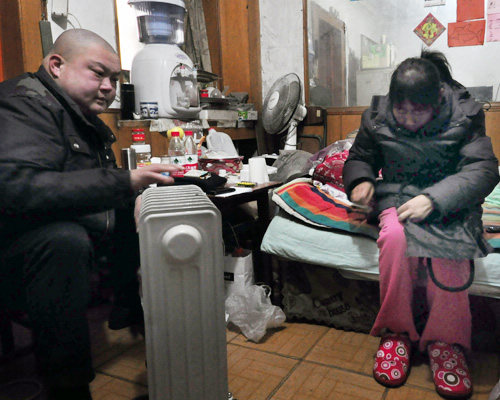|
 |
|
THROUGH THICK AND THIN: Liao Dan keeps his wife Du Jinling company as she sews purses to be sold online at their apartment in Beijing on December 13, 2012 (CFP) |
Gu said that the government subsidy of around 700 billion yuan ($111 billion) a year would be totally affordable and would only account for 7.2 percent of total annual government expenses if implemented.
Wider coverage
According to official figures, urban residents constituted 51.27 percent of China's total population at the end of 2011. With even more people leaving the countryside to find work in cities, accelerated urbanization poses new challenges to the country's social security administration.
The major components of social security in China are the basic pension, medical insurance and living allowance systems. Under all three systems, each province, municipality and autonomous region is funded separately and designs different schemes for rural and urban residents.
According to a report submitted to the 18th National Congress of the Communist Party of China last November, which outlines the country's development roadmap for the next five years, China should institute a complete, multi-tiered and sustainable system for providing basic social security for both the urban and rural population, with emphasis on making the system more equitable and sustainable and ensuring the smooth transfer of social security accounts between localities.
Hu Xiaoyi, Vice Minister of Human Resources and Social Security, said that such reforms would further remove barriers to labor migration within the country.
According to Hu, compared with the basic medical insurance system and the minimum living allowance system that had achieved universal coverage in the country by the end of 2011, the basic pension system was the last one to be instituted.
Official figures show, by the end of last September, nearly 750 million people had joined some form of pension insurance system, under different schemes for government employees, urban enterprise employees, unemployed urban residents and rural farmers.
As many as 125 million elderly people in the nation receive pensions every month, according to a statement from the Ministry of Human Resources and Social Security in November 2012.
In the labor market, those not covered by pension insurance are mainly migrant workers and farmers whose land has been expropriated, and private sector employees who work on a seasonal or temporary basis and lack formal labor contracts with their employers. The government has a plan to expand total coverage to 807 million people by the end of 2015 by including these marginalized groups of workers.
Yang Chengzheng, 37, was a farmer from Anhui Province before traveling to Beijing to seek work as a manual laborer in the transportation and construction sectors 10 years ago. "I only work for subcontractors and do not have a labor contract. I don't know how to join the urban pension insurance system for employees," he told People's Daily.
Yang has not joined the rural pension insurance system either, although he qualifies for it. The reason is that the basic monthly endowment paid by the government is only 55 yuan ($9) once he reaches 60. Although the government also subsidizes the personal account by up to 10 percent of the premium paid by individuals, Yang still does not think it is worth the trouble traveling so far back home to complete the paperwork.
Participants of basic pension insurance for urban residents also receive very low monthly pensions. However, retirees of government organizations and public service institutions are granted much more handsome retirement packages, which has long been called a great social injustice.
He Wenjiong, a professor at Zhejiang University researching social security policies, said that the unfair access to social security services in China has historical reasons since the social safety net was specifically designed to cover civil servants and urban employees in the beginning. "But under a universal social security system, every citizen should have equal access to basic services, he said.
Speaking to China Youth Daily, Song Xiaowu, President of the China Society of Economic Reform, holds a similar view. "Social security is a public product provided by the government and all public products should be equitable in nature."
Email us at: lili@bjreview.com | 